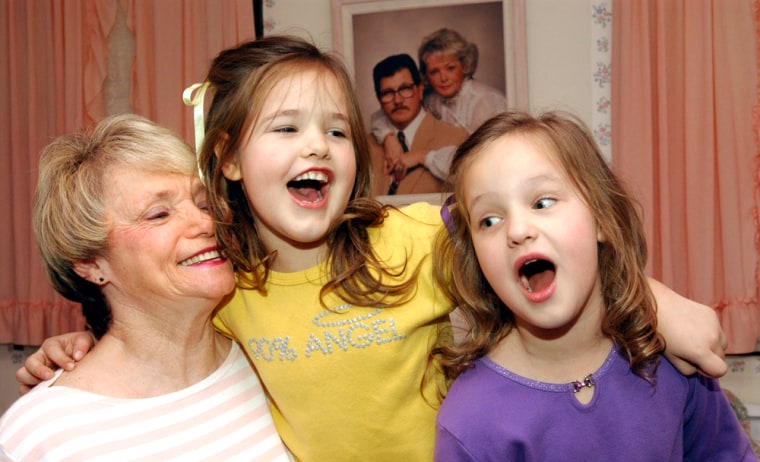At 63, while many of Judith Cates’ peers are contemplating retiring to Florida, she’s taking her 5-year-old twins to pizza parties and picking up toys.
Just keeping the girls’ hair combed can be a full-time task.
“Carli, you look like a ragamuffin,” she said, smiling as one of the girls’ hair drooped in her face.
Cates gave birth when she was 57 — even older than a New York woman who gave birth to twins this month just shy of her 57th birthday. A 59-year-old Georgia woman is pregnant with twins and due in December.
As medicine has advanced, so has the ability of older women to conceive.
A report released Tuesday by the Centers for Disease Control and Prevention found the number of births to women over 40 exceeded 100,000 for the first time in 2003. It also found there were 1,512 first-time mothers between the ages of 45 and 54 last year.
Cates and her husband, Carl M. Cates Jr., 53, concede they have endured some awkward moments, such as when people have assumed the girls are their grandchildren. But they wouldn’t trade it for the world.
“They keep us laughing with everything they do and say,” Judith Cates said. “If I wasn’t so old, we’d try for two more.”
Some advantages
Researchers say older parents have some advantages. A study of 30,000 households showed that people who had children in their 40s were better off financially, spent more time with their children and had a closer connection to the children’s friends than younger parents, said Brian Powell, a sociology professor at Indiana University.
“The older you were as a parent, the better off the child,” Powell said.
But others question what happens when older parents suffer health problems or die. Even some family members have questioned the Cateses’ decision.
Judith Cates’ niece, Traci Wells, 31, of Owensboro, Ky., said she’s not sure she would recommend other women in their 50s have children.
“I’m concerned about when they get older, having to deal with the loss of their parents at an early age,” Wells said.
The Cateses opted to leave that in God’s hands when they decided to try to conceive three years into their marriage.
“My mom lived to be 83. It was a wonderful life,” Judith Cates said. “I pray to God I will live to be her age and have that much time with my girls and my husband. That’s something that nobody knows.”
In-vitro fertilization
Cates conceived through in-vitro fertilization after several attempts and thousands of dollars. She and her husband cried the day they first saw the hearts beat on a monitor in her doctor’s office.
Still, being pregnant at a late age presented some challenges.
One day, Cates left the doctor’s office in tears after she heard someone say she looked awfully old to be pregnant.
For the first three months of her pregnancy, she had to have daily injections to prevent a miscarriage, and she was put on bed rest the last few months. But Cates avoided many other complications associated with pregnancy among older women, and Margaret Jan Marie and Carli Sue Morgan were born at nearly full-term on Dec. 12, 1998.
“They were healthy, just perfect when they came out,” she said. “We were so lucky there.”
Carl Cates, who works two jobs while his wife stays home with the girls, said parenting the twins is “an experience we enjoy 100 percent, if not more.”
The family stays active, going swimming almost daily, taking frequent walks in the park and spending many evenings playing games together.
Then there’s nap time. Neither parent hesitates to rest when the girls do.
'Long term has yet to be defined'
Their pastor, Stephen Schwambach at Bethel Temple, said the couple are proof that that parenting improves as people get older.
“I think what I observed in the Cateses is a sense, ’We’d almost missed it, and then God was so good to us to give us this opportunity,”’ Schwambach said. “There’s this joy in them that’s so apparent.”
Dr. Wendy Hansen, chief of high-risk obstetrics at the University of Kentucky Medical Center, said older patients who have children with the help of fertility treatments are generally glad they did.
The question is whether 20 years from now, people will view modern fertility treatments that have allowed older women to get pregnant as a good thing, Hansen said.
“The long term has yet to be defined,” Hansen said.
